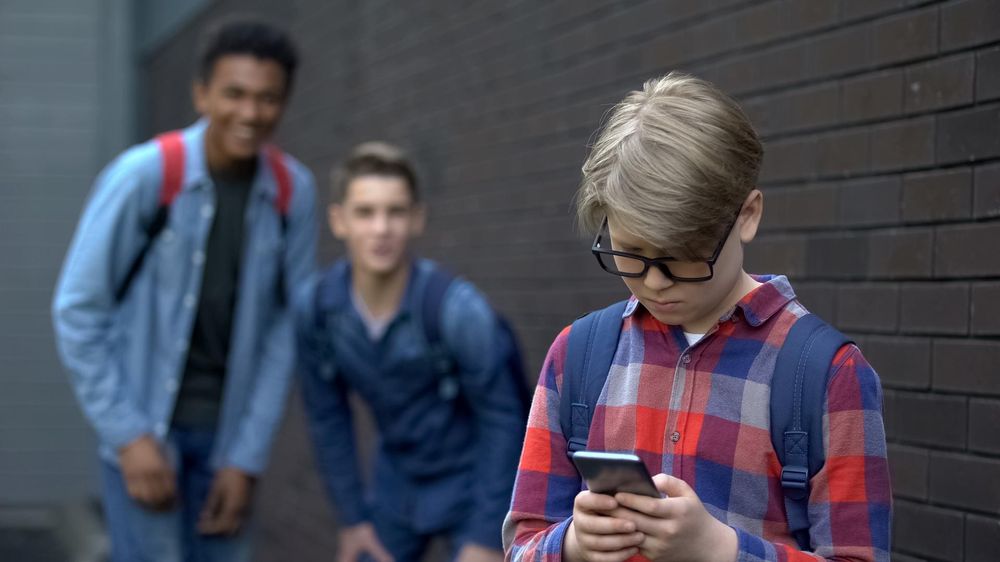BENESSERE DIGITALE
Cosa ogni genitore dovrebbe sapere sul cyberbullismo
Il cyberbullismo è un problema in crescita che può avere effetti a lungo termine sulla salute mentale e sul benessere di un bambino. Con la diffusione dei media digitali, è diventato più facile per i bulli prendere di mira le loro vittime online. Come genitore, è importante essere consapevoli dei rischi associati al cyberbullismo e prendere misure per proteggere il proprio bambino. Discuteremo di cosa sia il cyberbullismo, come possa influenzare il vostro bambino e cosa potete fare al riguardo.

Tutto è iniziato quando un gruppo di compagni di classe di Sarah ha creato un account Instagram falso con il nome "BruttaSarah" e ha iniziato a pubblicare commenti cattivi sulla sua apparenza. I post hanno rapidamente ottenuto trazione, con sempre più studenti che si univano e lasciavano messaggi odiosi.
Inizialmente, Sarah ha cercato di ignorare i commenti e si è detta che non erano veri. Ma man mano che i messaggi continuavano a arrivare, ha iniziato a sentirsi sopraffatta e vergognosa del suo aspetto. Ha smesso di pubblicare sui social media del tutto e ha iniziato ad evitare i suoi compagni di scuola.
Poi le cose sono peggiorate. I bulli hanno iniziato a inviarle messaggi minacciosi attraverso app di messaggistica anonime, dicendole di uccidersi e che nessuno le voleva.
Il caso di Sarah potrebbe essere fittizio, ma la realtà del cyberbullismo è troppo reale. Quasi la metà degli adolescenti statunitensi ha subito almeno una forma di bullismo o molestia online. Diamo un'occhiata più da vicino a cosa sia il cyberbullismo e a cosa puoi fare per proteggere tuo figlio da esso.
Cos'è il cyberbullismo?
Il cyberbullismo è l'uso della tecnologia per molestare, imbarazzare o intimidire qualcuno. Può assumere molte forme, tra cui l'invio di messaggi cattivi o minacce, la diffusione di voci, o la pubblicazione di foto o video imbarazzanti. Il cyberbullismo può avvenire sui social media, tramite messaggi di testo o email, o attraverso piattaforme di gioco online. Le ragioni più comuni per essere vittime di bullismo includono l'aspetto fisico, razza/etnia, genere, disabilità, religione, orientamento sessuale.
In cosa differisce dal bullismo tradizionale?
- Anonimato: Il cyberbullismo può essere fatto in forma anonima, il che rende più facile per il bullo evitare conseguenze. Questo può far sentire la vittima impotente.
- Permanenza: I contenuti online sono spesso permanenti e possono essere facilmente condivisi, il che significa che gli incidenti di cyberbullismo possono avere un impatto duraturo sulla vita della vittima.
- Portata: Il cyberbullismo può raggiungere un pubblico molto più ampio rispetto al bullismo tradizionale, il che può aumentare il danno e l'umiliazione subiti dalla vittima.
- Accessibilità: Il cyberbullismo può accadere in qualsiasi momento e da qualsiasi luogo, il che significa che le vittime possono sentirsi senza via di fuga dal bullismo.
- Gravità: Il cyberbullismo può essere ancora più dannoso del bullismo tradizionale, poiché può coinvolgere una vasta gamma di comportamenti abusivi come la condivisione di foto umilianti, la diffusione di voci false e le minacce.
Chi sono i cyberbulli?
Uno studio del 2018 condotto dal Pew Research Center ha scoperto che il 60% degli adolescenti statunitensi vittime di cyberbullismo conosceva il proprio persecutore. Di solito si tratta di altri compagni di classe. Ma poiché Internet permette l'anonimato, alcuni cyberbulli scelgono casualmente le loro vittime, senza conoscerle nella vita reale.
Ecco alcune possibili ragioni per cui qualcuno potrebbe diventare un cyberbullo:
- Mancanza di empatia: I cyberbulli potrebbero non avere empatia per le loro vittime e potrebbero non considerare le conseguenze delle loro azioni.
- Desiderio di potere: Alcuni cyberbulli potrebbero cercare di ottenere potere o controllo sugli altri comportandosi da bulli.
- Noia: Il cyberbullismo può talvolta essere il risultato della noia o del desiderio di attenzione.
- Pressione dei pari: I cyberbulli potrebbero sentire la pressione dai loro pari per comportarsi da bulli come modo per integrarsi o essere accettati.
- Problemi personali: I cyberbulli potrebbero aver vissuto traumi o problemi personali, come una vita familiare difficile, che possono contribuire al loro comportamento.
Segni che tuo figlio potrebbe essere vittima di cyberbullismo
Il cyberbullismo può avere gravi effetti sulla salute mentale e sul benessere dei bambini. Può portare ad ansia, depressione e persino al suicidio.
Come genitore, è importante essere consapevoli dei segnali che il proprio bambino potrebbe essere vittima di cyberbullismo. Questi segnali possono includere:
- Evitare o essere riluttante ad utilizzare Internet o i social media
- Diventare ritirato o umorale
- Diventare ansioso o depresso
- Cambiamenti nei modelli alimentari o di sonno
- Essere più segreto del solito
- Essere sconvolto o arrabbiato dopo aver utilizzato Internet o i social media
- Cambiamenti nelle prestazioni accademiche
Se noti uno qualsiasi di questi segnali nel tuo bambino, è importante agire per affrontare la situazione. Ecco alcuni consigli su cosa fare se il tuo bambino è vittima di cyberbullismo:
Rimani calmo e offri supporto
Se sospetti che il tuo bambino sia vittima di cyberbullismo, è importante rimanere calmo e offrire il tuo supporto. Fai sapere al tuo bambino che può parlarti di ciò che sta accadendo e che sei lì per aiutarlo - e non incolpare o criticare il tuo bambino per qualsiasi cosa che potrebbe aver portato al cyberbullismo.
Raccogli prove
Se sospetti che il tuo bambino sia vittima di cyberbullismo, cerca di raccogliere il maggior numero possibile di prove. Questo potrebbe includere screenshot di messaggi o post, email o altre forme di comunicazione. Assicurati di datare e temporizzare le prove in modo che possano essere utilizzate in seguito se necessario.
Segnala il cyberbullismo
Segnala il cyberbullismo alle autorità competenti o alla piattaforma online. La maggior parte delle piattaforme di social media ha una funzione di segnalazione che ti consente di segnalare il bullismo o il molesto. Se il bullismo è grave o minaccioso, potresti anche voler coinvolgere la polizia.
Blocca il cyberbullo
Incoraggia il tuo bambino a bloccare il cyberbullo dai propri account di social media e dalle app di messaggistica. Questo impedirà al bullo di contattare il tuo bambino e potrebbe persino fermare il cyberbullismo.
Cerca aiuto professionale
Se il tuo bambino sta vivendo ansia o depressione grave a causa del cyberbullismo, potrebbe essere necessario cercare aiuto professionale. Un consulente o terapeuta può aiutare il tuo bambino a elaborare i propri sentimenti e sviluppare strategie di coping.

Fai sapere al tuo bambino che può parlarti di ciò che sta accadendo nella sua vita online. (Fonte: Shutterstock)
Cosa possono fare i genitori per prevenire il cyberbullismo?
1. Parla con tuo figlio del cyberbullismo
Il primo passo per prevenire il cyberbullismo è parlare con tuo figlio. Spiega cos'è il cyberbullismo e perché è importante esserne consapevoli. Assicurati che tuo figlio sappia di poter venire da te se è mai vittima di cyberbullismo. Incoraggia la comunicazione aperta in modo che tuo figlio si senta a suo agio a parlarti delle sue esperienze online.
2. Insegna a tuo figlio come rispondere al cyberbullismo
È importante insegnare a tuo figlio come rispondere al cyberbullismo. Assicurati che sappiano che non devono mai rispondere a un cyberbullo, poiché ciò potrebbe aggravare la situazione. Incoraggia tuo figlio a salvare qualsiasi prova di cyberbullismo, come screenshot o messaggi di testo, in modo che tu possa prendere le misure appropriate.
3. Stabilisci regole per l'uso di internet e dei social media
Stabilire regole per l'uso dei media digitali da parte di tuo figlio può aiutare a prevenire il cyberbullismo. Limita il tempo che tuo figlio trascorre online e assicurati che non stiano utilizzando i social media o le app di messaggistica durante l'orario scolastico. Spiegagli perché è importante utilizzare Ohana per monitorare le app e i siti web che tuo figlio sta utilizzando. Stabilisci anche linee guida su cosa possono e non possono fare online.
4. Non fare affidamento solo su Ohana
Sebbene Ohana possa essere uno strumento utile nella prevenzione del cyberbullismo, non può sostituire un rapporto di fiducia, comunicazione aperta ed educazione sul comportamento online responsabile. Lavorando insieme, genitori e bambini possono contribuire a prevenire il cyberbullismo e creare un ambiente online più sicuro.